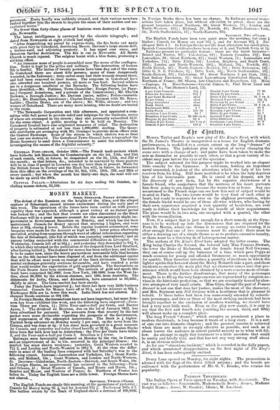Qt Quarts.
performances, is modelled to a certain extent on the long "drawee" of modern France. The judicious plan is adopted of never changing the scene save with a change of act ; and pains have been taken to make the acts as dissimilar as possible to each other, so that a great variety of in- cident may pass before the .eyes of the spectator.
The subject selected for this purpose might be worked into an elegant little comedy for the Gymnase. A nobleman, holding an important naval command, is jealous of the attentions which the lady of his love receives from his king. Still more mortified is he when the lady deprives him of his honourable post. He is cured of his despair, not by the discovery of new facts, but by the superior shrewdness of a female friend, who conjectures that the mistress of his heart prevents him from going to sea simply because she wants him at home. Any one accustomed to the French stage can see how this sort of subject would be treated in Paris. The two lovers would be very fond of each other at heart, but ready to separate for ever on the slightest provocation, while the female friend would be one of those all-wise widows, who having by their own experience acquired a vast quantity of heart-lore, are over ready to diffuse their knowledge for the benefit of their acquaintance. The piece would be in two acts, one occupied with a quarrel, the other with the reconciliation.
Now, if a subject that is just enough for a short comedy at the Gym- nese is to be worked up into the dimensions that are required for the Porte St. Martin, where one drame is to occupy an entire evening, it is clear enough that one of two courses must be adopted : there must be either a drawing out of a simple theme so as to produce excessive tenuity, or there must be a throwing in of heterogeneous matter.
The authors of The King's Rival have adopted the latter course. The King being Charles the Second, the beloved lady Miss Frances Stewart, the lover the Duke of Richmond, and the female friend Nell Gwynne, they can of course call up the humours of a time which gave Pepys so muds occasion for gossip and afforded Grammont so much opportunity for sparkle. They therefore introduce a quantity of incidents in which the lighter spirits that hovered about the Merry Monarch take a part, and these incidents so smother the main plot that no character comes into that pro-. rainence which would have been obtained by a more concise mode of treat- ment. There is the further disadvantage, that many of the personages brought in to fill up the very large canvass are represented by complete no- vices in the histrionic profession, so that we are constantly teased by abor- tive attempts of very small artists. Miss Glyn, though the part of Frances Stewart is not one that does her justice, makes the most of the character; end Mrs. Seymour acts Nell Groom with a heartiness that is pleasant.o behold. If these ladies had been less numerously attended by subordi- nate personages, and two or three of the most striking incidents had been brought together to the exclusion of needless wadding, we should have had a very neat little work. Even as the play now stands, it is easy to see that the first and fourth acts (omitting the second, third, and fifth) will almost make up a complete piece.
The long French " drama " which occupies so prominent a place in modern theatricals, is long because it treats of a long story. It is a sort of epic cut into dramatic chapters ; and the greatest success is achieved when these are made as strongly effective as possible, and each as it closes leaves the audience in almost painful anxiety as to what will fol- low. An attempt to apply this treatment to a little anecdote that could be neatly and briefly told, and that has not any very strong stuff about it, is an obvious mistake.
As for one " obnoxious incident," which is recorded in the daily papers, and which occasioned disapprobation on the first night of The King's Rival, it has been subsequently omitted.


































 Previous page
Previous page